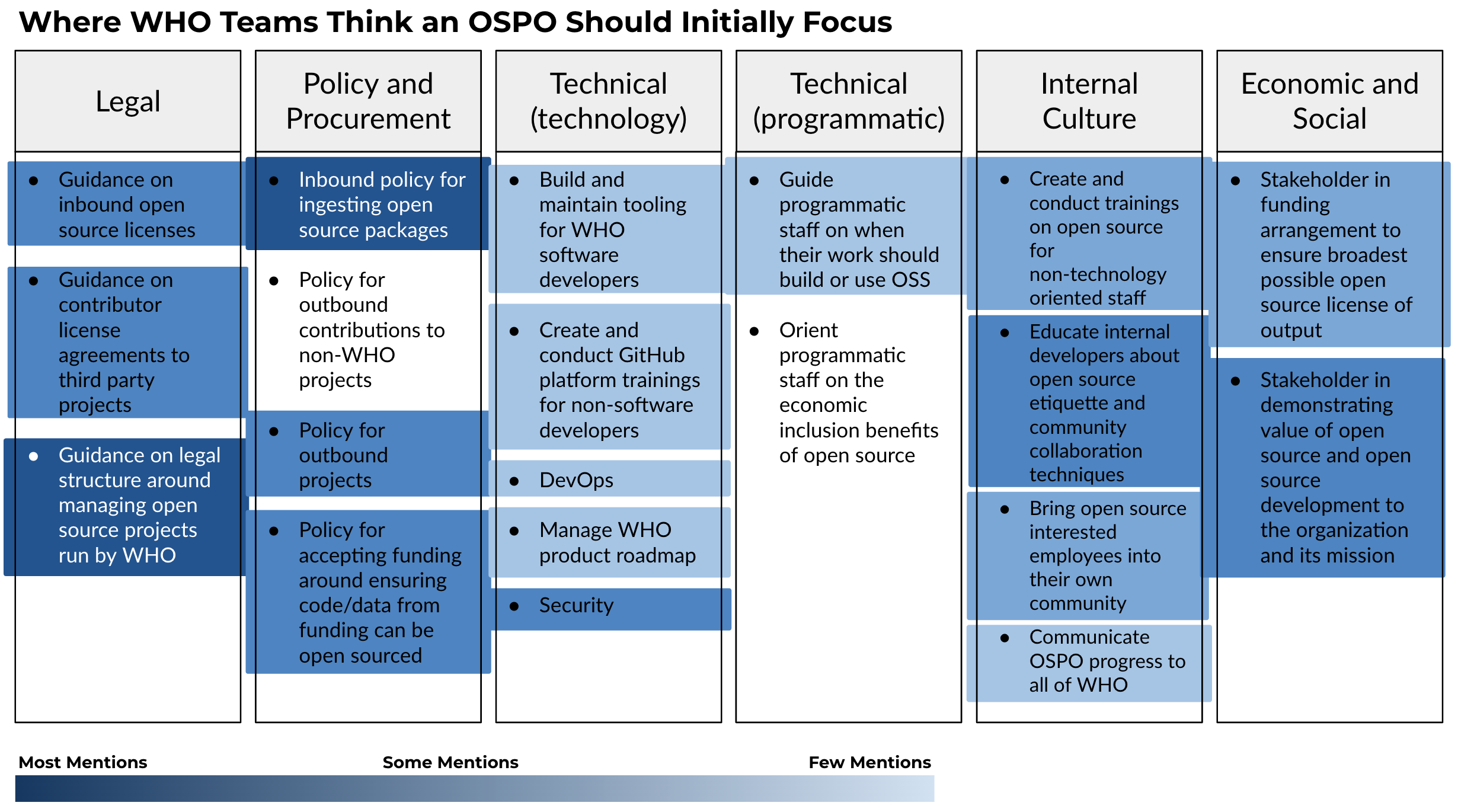A first in the UN system
Since June 2020, GitHub has supported the World Health Organization (WHO) through our Tech for Social Good and Expert Services teams. Over this period, GitHub has helped WHO strengthen its inner source (internal, organization-wide) software development processes. For the past eight months, GitHub has also supported the creation of a WHO Open Source Programme Office (OSPO). (1) While there are OSPOs in large tech companies, academic institutions, and governments, the WHO OSPO will be the first in the greater United Nations (UN) system.
Apply here to be the WHO OSPO Lead
How do OSPOs in the UN system differ from others?
Technology is playing an increasingly important role in the design, development, and implementation of public health solutions, and open source software (OSS), tools, AI algorithms, data, and content are an important part of the public health technology ecosystem.
The primary purpose of an OSPO is to create capacity within an organization so that everyone feels empowered to use and develop open source solutions. Most organizations create OSPOs to establish open source strategies, processes, and policies. (2) In other sectors, OSPOs primarily focus on bettering organizational efficiency in open source engagement. While that’s certainly a benefit, there are unique considerations of an OSPO in the UN system.
More equitable access to open source employment
In some countries, UN agencies are one of the largest employers of technologists. Creating an OSPO in a UN agency may increase open source software (OSS) employment opportunities in low- and middle-income countries in sub-Saharan Africa, Latin America, and South/east Asia.
Digital Public Goods (DPGs)
OSPOs can be sustainable vehicles to create new and surface existing DPGs, which can reduce duplication of efforts in humanitarian crises and maximize funding. Contributing to DPGs can also further guidance on ethical use and development of open source. Read more about GitHub’s work with DPGs and the DPGA.
More transparency and opportunities to collaborate
Using and developing OSS often results in organizational culture shifts to more transparency and collaboration. An OSPO in the UN can facilitate this change in the tools it uses, the policies it sets, and openness and support it provides to its staff.
Scoping a WHO OSPO
Creating a WHO OSPO required building off of existing resources, such as the TODO group’s guides. WHO’s internal organizational knowledge and GitHub’s expertise in open source software were also critical.
Scoping Process
The first step was to decide on the scope. Too narrow, and WHO staff may not have the support needed to advance their open source projects. Too broad, and the OSPO may become overwhelmed with the volume of requests it receives.
GitHub Tech for Social Good spoke to teams at WHO that were at varying stages of OSS use and development. All teams used at least one open source tool, framework or software. One-third were building OSS, one-third were planning on and one-third were deciding whether to open sourcing their software. This provided a wide set of perspectives on which functional areas a WHO OSPO should cover, including legal, procurement, internal culture, and technical.
Each team indicated in which functional areas they needed support to use or develop OSS in the short-term. These responses were recorded and turned into a heatmap.

Over the next few months, GitHub staff across the company that have different open source domain expertise, engaged in a series of conversations with WHO. These discussions covered:
- The cost/benefit of automated tooling
- How an OSPO can answer legal and compliance questions on open source licenses
- Existing OSPO networks that can support WHO
- How an OSPO should facilitate technical discussions
- The communications and culture change role of an OSPO
We then considered three possible professional profiles for the first OSPO Lead role:
- Primarily technical → open source software developer, product manager, or technical project manager
- Primarily legal → open source lawyer / open source policy maker
- Primarily organizational → strong OSPO management experience
WHO decided to move forward with primarily technical candidates. Other functional areas could be covered through external vendor agreements or internal consultants (contractors).
How do I get involved?
WHO is currently hiring for its OSPO Lead through its career portal and is seeking qualified and interested candidates globally, regardless of nationality. The position will be based in Berlin, Germany, and relocation and visa assistance will be provided if needed. This is a senior role and anyone interested in applying is encouraged to carefully look through the terms of reference.
GitHub is excited to continue working with WHO and will post more updates here on the Social Impact site after the OSPO Lead has been selected and has started.
Can GitHub help me create an OSPO in my organization?
You can check out this slide deck that contains some of the materials we created to help WHO scope their OSPO. We will update this blog post as more materials become available. The TODO Group also has an extensive guide on how to create an OSPO. We can speak to social sector organizations about OSPOs and may be able to help on a case-by-case basis. Please reach out to malakumar85@github.com if you’re interested.
- A special thanks goes to GitHub’s OSPO, Policy, and Communities teams for their contributions.
- “Using” OSS means adopting open source code for team work. “Developing” or “producing” or “building” OSS means writing and open sourcing code as a software application, tool or script.